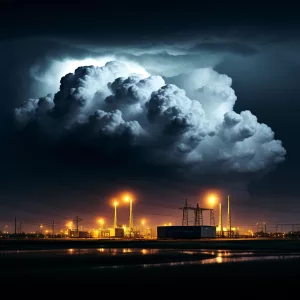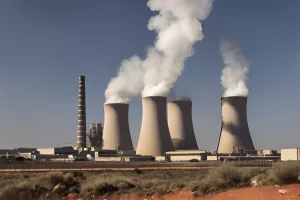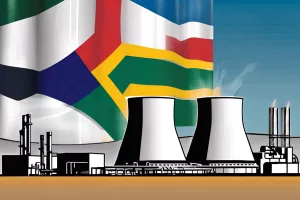Eskom, South Africa’s main electricity provider, is facing tough times in an ongoing energy crisis. With power outages called load shedding becoming a regular part of life, the company struggles to meet its energy goals, recording a low energy availability factor of just 60.6% for 2025. Despite efforts to improve maintenance and reduce reliance on expensive diesel, challenges like high debt and outdated infrastructure make it hard for Eskom to keep the lights on. However, there’s a glimmer of hope as renewable energy projects and efficiency improvements show promise for a brighter future.
South Africa’s energy world is facing big problems, with frequent power outages making life tough for everyone. Eskom, the main electricity provider, has warned that the power grid is fragile after several units failed, putting the country at risk of more blackouts. However, there is hope with the new Kusile Power Station, which will soon add a lot of electricity to the grid and help the country move towards cleaner energy. This project not only aims to solve immediate power issues but also shows South Africa’s commitment to better air quality and sustainability. Despite the progress, the road ahead is still challenging, and Eskom must keep a close eye on the situation to ensure a brighter energy future.
Eskom is raising electricity prices in South Africa, with a hike of 12.74% starting April 1, 2025, for direct customers and 11.32% from July 1, 2025, for municipal customers. This price increase is part of a plan to help Eskom stabilize its finances amid ongoing challenges. As electricity costs rise, consumers will feel the pinch, especially in a country with high unemployment and inequality. To adapt, Eskom is changing its pricing structure to balance fixed and variable costs, encouraging solar use and smarter energy consumption. These changes aim to create a more sustainable energy future for all South Africans.
South Africa is facing a tough energy crisis, with frequent power outages and problems at its main electricity provider, Eskom. Recently, the government assured people that these issues would be resolved soon. Despite the challenges, including old power stations and technical failures, there is hope as leaders work on solutions to stabilize the power supply. The journey ahead is not easy, but there’s a strong commitment to creating a brighter and more reliable energy future for everyone in the country.
Eskom, South Africa’s power giant, is facing tough times as it tries to recover from financial troubles and a huge municipal debt that could reach R100 billion. A recent meeting at Megawatt Park brought important leaders together to discuss ways to improve Eskom’s operations and fight corruption. Despite some progress, the company still struggles with old agreements that make it hard to manage costs, and it has a lot of unused coal piling up. As Eskom plans its future, it must balance its past with new energy needs, aiming for a brighter, more sustainable path ahead.
Cape Town is fighting against Eskom’s shocking plan to raise electricity prices by as much as 44%. This increase could make life harder for many residents and small businesses, leading to higher bills and more protests. Mayor Geordin HillLewis is pushing back, worried about how these changes will hurt the city’s economy and its most vulnerable people. Despite the challenges, Cape Town is working hard to support lowincome households with programs that offer cheaper electricity, but these efforts are now at risk because of Eskom’s proposed hikes. The city’s determination to stand strong shows its commitment to a fair and brighter future for everyone.
Eskom is bringing a bright change to South Africa’s energy scene by improving how it manages power and reduces blackouts. With better maintenance and teamwork, the utility has gone almost 200 days without rolling blackouts, giving hope for a steadier power supply until March 2025. Eskom’s focus on efficient operations has cut costs significantly, especially in diesel use, making energy production more affordable and sustainable. As they continue to innovate and strengthen their practices, Eskom is paving the way for a more reliable future in energy for all South Africans.
Cape Town’s Mayor, Geordin HillLewis, has strongly opposed Eskom’s proposed 44% electricity tariff increase and written to the National Energy Regulator expressing concerns over the impact on households and smaller businesses. The city aims to reduce its reliance on Eskom by procuring more costeffective power from the open market and has introduced measures to protect less affluent households from tariff hikes. Mayor HillLewis has called for scrutiny of Eskom’s cost structures and margins, urging the utility to improve its operational strategy and investigate alternative revenue sources.
Eskom, the national power provider in South Africa, achieved a remarkable feat by going 100 consecutive days without load shedding. This achievement is a result of the organization’s tenacity and tactical planning, and has generated an estimated R6.2 billion decrease in Open Cycle Gas Turbines diesel expenditure. Eskom’s immediate focus is to recover more power from their generation coal fleet and Koeberg Unit 2 before the end of the year, and they attribute their success to the relentless efforts of their devoted and proficient employees.
“A New Era of Energy Stability in South Africa: 80 Days without Loadshedding and Counting”
South Africa’s energy sector is enjoying a remarkable period of stability, celebrating 80 days without power shortages. Eskom’s recovery approach has led to a significant decrease in unplanned power outages, now at a manageable 12,000MW. Eskom’s plan has been characterized by an insightful understanding of the country’s electricity demand trends, allowing for optimized power demand patterns. As Eskom continues on its journey of improvement, South Africa can look forward to experiencing many more days free from loadshedding.
Eskom, the largest power utility in South Africa, has achieved an unprecedented 65day suspension of load shedding, signaling a significant improvement in power reliability. This has resulted from Eskom’s strategic efforts to bolster the dependability of its power generation fleet and streamline maintenance, as outlined in its Generation Operational Recovery Plan. Key performance indicators such as the Unplanned Capacity Loss Factor and Sustained Energy Availability Factor demonstrate Eskom’s progress towards greater reliability. Despite these achievements, Eskom urges the public to continue using electricity judiciously, promoting a reliable energy future for South Africa.
Eskom, South Africa’s national power corporation, has achieved a significant improvement in energy availability, with an Energy Availability Factor (EAF) of 70.78%, ending nearly three years of struggle with power supply. This progress is credited to the initiatives implemented by the current Eskom board, including solidifying the management team, implementing performancebased incentive bonuses, and identifying critical power stations requiring immediate attention. Eskom’s dependence on Open Cycle Gas Turbines (OCGTs) has also lessened due to the improved performance of its coal fleet, resulting in lower diesel usage and greater efficiency. The contribution of businesses and renewable energy sources also signals a hopeful outlook for the future of South Africa’s energy sector.
Eskom, South Africa’s national electricity supplier, has achieved a new record of three weeks of continuous and uninterrupted power supply, surpassing the previous record of 19 days. This achievement is attributed to tenacity, timely upkeep, and upgraded management practices. However, the Minister warns against complacency and emphasizes the need for persistent investment, rigorous management, and steadfast commitment to maintain this success. Eskom’s recent achievement showcases its capacity to rise above the odds, mapping out a new, positive course in South Africa’s power narrative.
South Africa is facing an energy crisis with frequent blackouts and load shedding. Public sentiment is turning against Eskom, accusing them of corruption and mismanagement. Spain’s Iberdrola demonstrates the challenges and reforms needed for a transition to renewable energy. South Africa needs audacious decisions and innovative solutions to restructure the energy sector for a sustainable future.
Dan Marokane, the CEO of Tongaat Hulett, is rumored to be the next Eskom CEO. Marokane’s successful track record at Tongaat Hulett and previous role in Group Capital at Eskom make him a potential candidate to resuscitate the beleaguered state power entity. The prospect of his appointment has elicited mixed reactions, but the hope is for his transformative strategies to reinvigorate Eskom and bolster the country’s power infrastructure.
Cape Town experienced a widespread power outage caused by theft and vandalism of Eskom’s infrastructure, resulting in delays in restoration efforts. The city’s allocation of electricity is governed by national legislation, making it challenging to solve the issue. The blackout originated from unplanned faults, leaving residents without power for over 80 hours and prompting local protests. Despite the power cut, life in Cape Town continues to thrive, with extraordinary car deals and a dynamic spirit prevalent.
















